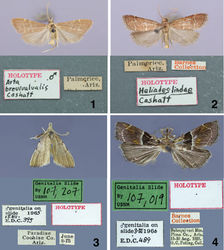Paragalasa exospinalis
| Notice: | This page is derived from the original publication listed below, whose author(s) should always be credited. Further contributors may edit and improve the content of this page and, consequently, need to be credited as well (see page history). Any assessment of factual correctness requires a careful review of the original article as well as of subsequent contributions.
If you are uncertain whether your planned contribution is correct or not, we suggest that you use the associated discussion page instead of editing the page directly. This page should be cited as follows (rationale):
Citation formats to copy and paste
BibTeX: @article{Solis2013ZooKeys344, RIS/ Endnote: TY - JOUR Wikipedia/ Citizendium: <ref name="Solis2013ZooKeys344">{{Citation See also the citation download page at the journal. |
Ordo: Lepidoptera
Familia: Pyralidae
Genus: Paragalasa
Name
Paragalasa exospinalis Cashatt sp. n. – Wikispecies link – ZooBank link – Pensoft Profile
- Paragalasa exospinalis Cashatt, 1968, nomen nudum, Solis et al. 1995[1]
Description
Alar expanse. 19 to 22 mm.
Head. Labial palpus ochreous, darker laterad; frons, vertex, and occiput ochreous to tan; antenna ochreous.
Thorax
Upper surface pale reddish-brown, lower surface reddish-brown. Forewing pale reddish-ochreous; costa irrorated with fuscous, especially at base and at origin of antemedial and postmedial lines; antemedial line light reddish-brown, indistinct, extending from about one-third length of costa to about one-third length of inner margin; postmedial light reddish-brown and extending from about two-thirds length of costa sharply excurved to about two-thirds length of inner margin. Hind wing light pinkish to brownish-white with terminal line darker; fringe ochreous to brownish-ochreous. Legs ochreous, sprinkled with dark brown laterad, midtibia scale tufts fuscous.
Abdomen. Upper surface greyish-ochreous, fuscous laterad, lower surface ochreous.
Genitalia. As described for the genus.
Type data
All the type specimens in the USNM. The male holotype is from Paradise, Cochise Co., Arizona, June 8–15 and is labeled as the holotype. Twenty-six male and thirteen female paratypes from UNITED STATES: ARIZONA are labeled as follows: UNITED STATES: ARIZONA: eighteen males and two females, Baboquivari Mts., Pima Co., Ariz., elevation approximately 5000 ft., 15–30 June, 1923, O. C. Poling Coll.; four males, Brown’s Canyon, Baboquivari Mts., Pima Co., Ariz., elevation approximately 5000 ft., 1–15 June 1923, O. C. Poling Coll.; one female, Brown’s Canyon, Baboquivari Mts., Pima Co., Ariz., elevation approximately 5000 ft., 15–30 May 1923, O. C. Poling Coll.; two females, Huachuca Mts., Ariz., no date given; three males and three females, Palmerlee, Arizona, no date given; one male, Paradise, Cochise Co., Ariz., June 8–15; one male, Paradise. Cochise Co., Ariz., July; one male and two females, Redington, Ariz., no date given; one female, Santa Rita Mts., Ariz., June 11, 1898. B. A. Schwarz.
Life history
Unknown.
Remarks
This species might be confused with Negalasa rubralis at first glance. Distinguishing characters are the fuscous antemedial and postmedial lines on the costa, generally lighter coloration, and the longer, more narrow forewings. The distinctness of the median band is variable.
Original Description
- Solis, M; Cashatt, E; Scholtens, B; 2013: New North American Chrysauginae (Pyralidae) described by E.D. Cashatt ZooKeys, 344: 55-71. doi
Other References
- ↑ Solis M, Becker V, Munroe E (1995) Chrysauginae. In: Heppner J (Ed) Checklist: Atlas of Neotropical Lepidoptera. Association of Tropical Lepidoptera, Gainesville, Florida, 80-105.
Images
|

![Figures 11–16. Male, female genitalia. 11 Paragalasa exospinalis holotype male, USA, Arizona, Cochise Co., Paradise, June 8-15 [no year given], EDC 395, USNM 107207 12 phallus, data same as previous 13 paratype female, USA, Arizona, Redington, [no collection date on label], EDC 398, USNM 107089 14 Penthesilea sacculalis baboquivariensis holotype male, USA, Arizona, Pima Co., Baboquivari Mts., 15–30 Aug 1923, O.C. Poling, Coll., Barnes Collection, EDC 489, USNM 107019 15 phallus, data same as previous 16 allotype female, USA, Arizona, Pima Co., Baboquivari Mts., [days crossed out] Aug 1924, O.C. Poling, Coll., Barnes Collection, EDC 138, USNM 100018.](https://species-id.net/o/thumb.php?f=ZooKeys-344-055-g003.jpg&width=171)